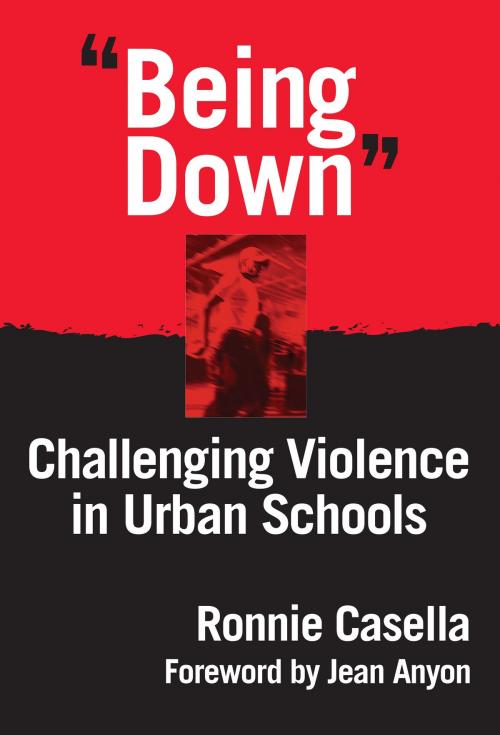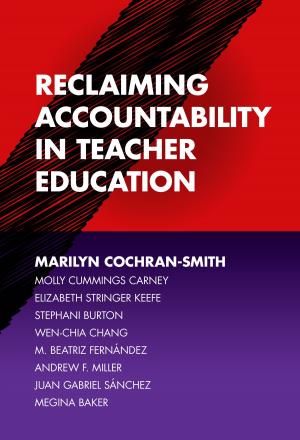Being Down Challenging Violence In Urban Schools
Nonfiction, Reference & Language, Education & Teaching, Educational Theory, Philosophy & Social Aspects| Author: | Ronnie Casella | ISBN: | 9780807770559 |
| Publisher: | Teachers College Press | Publication: | December 15, 2009 |
| Imprint: | Language: | English |
| Author: | Ronnie Casella |
| ISBN: | 9780807770559 |
| Publisher: | Teachers College Press |
| Publication: | December 15, 2009 |
| Imprint: | |
| Language: | English |
This book looks at the lives of young people and the violence that is a daily part of their world in an urban high school. “Being Down” studies school violencecomprehensively—linking school ethnography, policy analysis, and urban studies and encompassing city politics, racism, policing, and systemic and economic injustices in it’s all-too-real portrait of youth violence in American society.
Rich with dialogue, this timely volume considers school violence in its many forms, including gun and weapon usage, assault and harassment, bullying, fighting, suicide, and hate crimes. In addition to youth violence, the book examines federal policies and court cases that have shaped judicial and punitive responses to violence. Chapters cover:
- Zero tolerance policy
- School discipline
- Urban policing
- Community and school relations
- Segregation and school inequities
- Alternative schools
- Boot Camps
Ronnie Casella is assistant professor at Central Connecticut State University. He has taught high school in Colombia, South America. He is the author of At Zero Tolerance: Punishment, Prevention, and School Violence.
“‘Being Down’ offers an insider's perspective on the problem of violence in schools. Casella provides his readers with vivid detail on the nature of violence in schools and a glimpse into why many of the approaches taken to prevent violence fail. Most importantly, he provides solid and practical advice on what can be done to make schools safer. For educators who are desperately searching for solutions to this growing problem, ‘Being Down’ will offer sound advice.”
—Pedro Noguera, Harvard University Graduate School of Education
“Casella’s book is right on target. In violence prevention, as with so many other educational problems, social policies must supplement educational policies in our search for sustainable solutions. Ronnie Casella demonstrates that it is up to all of us to work together to rid society of the underlying causes of rage and violence in America and thus make our schools safer.”
—From the Foreword by Jean Anyon
This book looks at the lives of young people and the violence that is a daily part of their world in an urban high school. “Being Down” studies school violencecomprehensively—linking school ethnography, policy analysis, and urban studies and encompassing city politics, racism, policing, and systemic and economic injustices in it’s all-too-real portrait of youth violence in American society.
Rich with dialogue, this timely volume considers school violence in its many forms, including gun and weapon usage, assault and harassment, bullying, fighting, suicide, and hate crimes. In addition to youth violence, the book examines federal policies and court cases that have shaped judicial and punitive responses to violence. Chapters cover:
- Zero tolerance policy
- School discipline
- Urban policing
- Community and school relations
- Segregation and school inequities
- Alternative schools
- Boot Camps
Ronnie Casella is assistant professor at Central Connecticut State University. He has taught high school in Colombia, South America. He is the author of At Zero Tolerance: Punishment, Prevention, and School Violence.
“‘Being Down’ offers an insider's perspective on the problem of violence in schools. Casella provides his readers with vivid detail on the nature of violence in schools and a glimpse into why many of the approaches taken to prevent violence fail. Most importantly, he provides solid and practical advice on what can be done to make schools safer. For educators who are desperately searching for solutions to this growing problem, ‘Being Down’ will offer sound advice.”
—Pedro Noguera, Harvard University Graduate School of Education
“Casella’s book is right on target. In violence prevention, as with so many other educational problems, social policies must supplement educational policies in our search for sustainable solutions. Ronnie Casella demonstrates that it is up to all of us to work together to rid society of the underlying causes of rage and violence in America and thus make our schools safer.”
—From the Foreword by Jean Anyon















